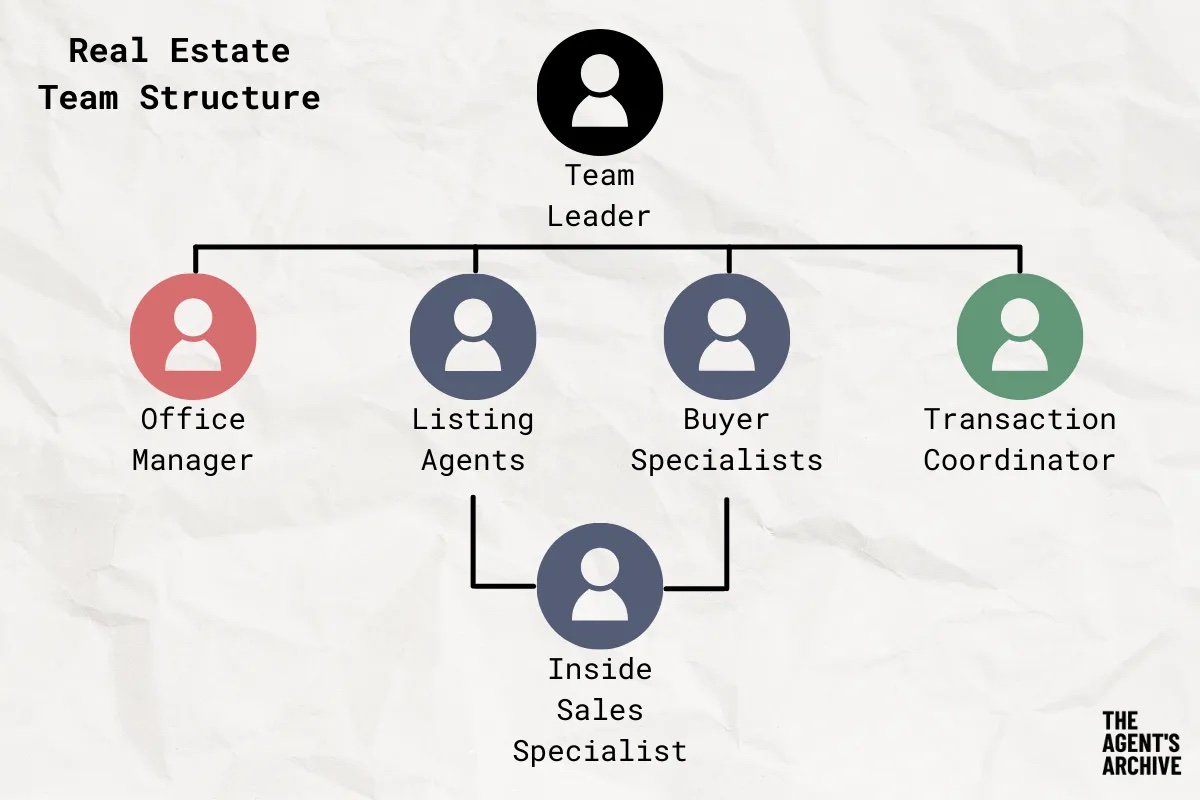Learn how to build a real estate team that actually works. From smart hiring and strategic onboarding to setting killer goals, discover your roadmap to next-level success.
Branding & Design
So you’re wondering how to build a real estate team that’ll spearhead your hyperlocal market. Many agents find themselves at this point after being in the real estate industry for a few years. It could be time to aim higher and take your business to the next level with your own real estate team.
But you really have to ask yourself: Are you truly ready to start a real estate team? Are there any pitfalls you should be wary of? And where would you even start?
How Real Estate Teams Work
Real estate teams are the ultimate efficiency boosters for scaling your business. Real estate teams thrive on specialization. Each member has a specific role, and together they create a seamless process for clients. This approach not only maximizes productivity but also creates a consistent, high-quality experience for clients. Whether you’re considering how to join a real estate team or wondering how to build a real estate team, understanding the roles and structure is critical to making the right move.
By dividing tasks and leveraging individual strengths, these teams make it possible to handle more transactions, improve client experiences, and grow faster than going solo. Here’s a quick breakdown of how real estate teams are structured and function:
Key Traits of Successful Real Estate Teams
- Clear Communication: A well-organized team thrives on transparency. Regular check-ins and streamlined communication ensure everyone is aligned on goals and tasks.
- Defined Processes: From lead generation to closing, great teams rely on robust systems like CRMs and transaction management tools to keep operations smooth.
- Shared Vision: The best teams work toward a common objective, whether it’s dominating a niche market or increasing annual transactions. This shared focus keeps everyone motivated.
- Specialization: By assigning specific roles—like listing agents, buyer’s agents, or ISAs—teams maximize efficiency and allow members to excel in their areas of expertise.
Real estate teams are all about playing to strengths and creating a unified front. Whether you’re learning how to join a real estate team or how to build a real estate team from scratch, understanding the mechanics of a successful team is your first step toward thriving in the industry.

How to Build a Real Estate Team
- Build Your Foundation: Define Your Why
- Hire Key Roles and Responsibilities
- Plan Your Team Structure
- Define Systems and Processes
- Recruit High-Potential Team Members
- Get to Know Your Team
- Structure the Onboarding Process
- Set and Communicate Vision
- Establish Performance Metrics and Goals
1. Build Your Foundation: Define Your Why
Before diving into team building, assess whether you’re truly ready for leadership. Growing from a successful agent to an effective team leader requires more than just hitting impressive sales numbers.
Key Readiness Indicators:
- Consistent business volume exceeding personal capacity
- Strong leadership qualities and willingness to develop them
- Financial stability to support team growth
- Clear vision for team structure and development
If you’re unsure about your leadership readiness, explore these 9 ways to build confidence as a real estate agent. As your business grows, you’ll find yourself stretched thin across prospecting, marketing, client meetings, and property tours.
Take Karen Blevins of Churchill-Brown Real Estate as an example. Despite reaching 50 transactions annually, she waited until she felt fully prepared before expanding her team. While others suggested earlier expansion, she knew her personal readiness was crucial for long-term success.
Remember: Building a team is a significant investment of time, money, and energy. The right timing depends on your unique circumstances and readiness to take on the responsibilities of leadership.

2. Hire Key Roles and Responsibilities
Now it’s time to get to hiring. Depending on the size of your new team, you may decide to sign on a couple of agents you can mentor or a full admin team, marketing staff, and the whole shabang. The roles below are most important positions you’ll want to hire for as your business grows in scale.
An Administrative Assistant
While many real estate team leaders debate whether to hire a buyer’s agent or assistant first, hiring an administrative assistant early can be a strategic move. Though a buyer’s agent works on commission and helps convert leads, an assistant creates the foundation for a smooth-running operation. Whether in-office or virtual, an assistant handles key tasks that free up agents to focus on revenue-generating activities.
While your administrative assistant would traditionally be an actual person sitting in the office, you also have the option to hire a virtual assistant. Virtual assistants can do pretty much everything that a regular assistant can do. But if you hire one living in another country, you have the added possibility of getting an unbeatable price, thanks to exchange rates.
Key Responsibilities
- Manage all team communications and client follow-ups
- Handle scheduling for the entire real estate team
- Maintain CRM system and database updates
- Support agents with paperwork and documentation
- Coordinate office operations and supplies
Daily Operations
- Answer incoming calls and emails promptly
- Schedule and coordinate property showings
- Process new listings and update property status
- File and organize transaction documents
- Assist with marketing materials and social media
Goals
- Free up agents’ time for revenue-generating activities
- Ensure smooth operation of office systems
- Maintain excellent client response times
- Reduce administrative bottlenecks
- Support team growth and productivity

A Buyer’s Agent
Once you have all your real estate systems in place and you have an administrative assistant supporting them, you’ll be able to spend more of your time on producing more leads than ever before.
When your lead generation exceeds what you can handle personally, a buyer’s agent becomes the next logical hire. While newer agents might accept lower splits, an experienced agent can immediately adopt your systems and maintain productivity. The right hire will help sustain your momentum while strengthening the team’s reputation.
This agent’s main responsibilities will consist of lead conversion, showing properties, taking care of the buyer’s needs, making offers, negotiating, and prospecting for both buyer and seller leads.
Click the button below to learn more about pricing.
Key Responsibilities
- Convert leads into active buyers
- Guide clients through the entire purchase process
- Negotiate offers and handle transactions
- Prospect for new buyer and seller leads
- Build and maintain client relationships
Daily Operations
- Follow up with leads promptly
- Show properties and conduct market research
- Write and submit purchase offers
- Coordinate with lenders and other professionals
- Track client interactions and transaction progress
Goals
- Maintain high lead conversion rates
- Close transactions efficiently
- Generate referrals and repeat business
- Contribute to team revenue growth
- Uphold team standards and systems
While it may be tempting to hire rookie real estate agents that are willing to accept a lower commission split and can be coached and molded into your image, it’s a better idea to hire an already experienced and established real estate agent.
All successful real estate teams start with an already successful and experienced real estate agent. And for the team to continue to be successful and grow stronger, it needs to attract other successful and talented agents.

An Inside Sales Agent
Because you and your buyer’s agent will be busy closing deals, eventually you may find yourselves too busy to spend the necessary time to prospect, answering calls, and following up with potential new leads.
That’s when an Inside Sales Agent (ISA) becomes your next strategic hire, keeping your pipeline full through consistent prospecting and follow-up, allowing agents to focus on closing deals.
Key Responsibilities
- Generate new leads through proactive prospecting
- Qualify and nurture leads in the sales pipeline
- Contact expired listings and FSBOs
- Reach out to past clients and sphere of influence
- Convert leads into scheduled appointments
Daily Operations
- Make outbound prospecting calls
- Respond to new lead inquiries
- Manage follow-up sequences in CRM
- Update lead status and contact information
- Schedule appointments for showing agents
Goals
- Maintain consistent lead flow
- Achieve monthly appointment targets
- Increase lead conversion rates
- Build strong prospect relationships
- Keep CRM database current and accurate

A Listing Agent
As a real estate team leader, one of your main responsibilities is making sure that your buyer’s agents are busy closing deals year-round. But once you’re attracting so many clients that you can’t handle any more listings, it may be time to hire a seller’s agent to assist you with listings.
When your listing volume exceeds your capacity, bringing on a Listing Agent helps maintain growth and service quality. By handling property listings and marketing duties, they free you to focus on team leadership while expanding your market presence.
Key Responsibilities
- Determine optimal pricing strategies
- Prepare properties for market
- Create targeted marketing plans
- List and showcase properties
- Guide sellers through transaction process
Daily Operations
- Conduct listing presentations
- Coordinate property photography and staging
- Host open houses and broker tours
- Manage seller communications
- Review and negotiate offers
Goals
- Maximize seller returns
- Minimize days on market
- Expand team’s listing inventory
- Build strong seller relationships
- Maintain high service standards
Transaction Coordinator
When your team handles multiple transactions, a Transaction Coordinator keeps deals moving smoothly to closing. While licensing isn’t required, their attention to detail and process management skills free up agents to focus on client relationships.
Key Responsibilities
- Manage contract paperwork and disclosures
- Track and meet all transaction deadlines
- Coordinate with all parties through closing
- Submit and organize purchase documents
- Handle compliance requirements
Daily Operations
- Process new contracts and addendums
- Gather missing documentation
- Communicate with agents and vendors
- Monitor inspection and appraisal timelines
- Update transaction status in systems
Goals
- Ensure smooth closing processes
- Maintain organized transaction files
- Prevent timeline delays
- Support agent productivity
- Reduce transaction complications

Specialists
If you’ve made it to this point, congratulations! At this point, all of your major roles have been filled. But that doesn’t mean you have to stop here. As your real estate business grows , you may want to hire more buyers’ and sellers’ agents.
You may also consider hiring other specialists such as a listing manager, a marketing director, photographers, showing assistants, rentals’ agents, a success coach, etc.
But once you get to that point, you will be able to rely on your own judgment and experience to decide who to hire and when.

3. Plan Your Team Structure
As we mentioned earlier, teams come in all shapes and sizes. We can’t tell you exactly how to build a real estate team, however most teams consider these four main structures:
- Mentor and Mentee
- Two Agent Partners
- Team Lead Structure (pyramid0
- Lead Team Structure
Getting clear about which team structure you’ll follow will make future onboarding an easy and fluid process. From here, you can build an onboarding plan and new agent guide. Be sure to include necessary documents, handbooks, style guides, systems guides (such as your CRM, socials etc.) web access, and how to collaborate with other employees.

4. Define Systems and Processes
Systems and processes are the foundation for scaling your real estate team. Here are systems you need include (but are not limited to):
Branding and Identity
Your team’s brand is the first impression you make. Define your logos, colors, fonts, and messaging to maintain consistency. This applies to everything—business cards, listing presentations, and your website. Need help? AgentFire’s branding and logo integration services can get you started.

Tools and Tech
- CRM: A client relationship management system is essential for tracking leads and staying organized. AgentFire websites seamlessly integrate with popular CRMs to make lead management hassle-free.
- Transaction Management: Streamline contracts and deadlines with tools like BrokerMint or Paperless Pipeline.
- Lead Generation Tools: From IDX websites to email campaigns, equip your team with tools that generate and nurture leads consistently.
Content Marketing Strategy
Do you have a real estate website? How will you market your properties online? What kind of content will you produce? How do you plan to expand your online presence in the future? Before you jump in to any type of digital marketing, you’ll need a digital marketing strategy made specifically for your real estate business and clientele. The basis of this strategy will be your real estate website. For a website that is made to generate leads and foster overall real estate business success, reach out to our talented web designers at AgentFire and we’ll get you on the right track.
- Referral systems – How much are you willing to offer for a referral, both internally through your agents and between brokerages?
- Commission splits – How will you split commissions with your agents? Will you offer leads to your agents? And if they bring in their own leads, how will the split differ?
Commission Splits and Compensation
No real estate team will thrive without a fair and motivating commission structure. Here are some popular models:
- Fixed Splits: A straightforward option, such as a 60/40 or 70/30 split, where the team leader takes a percentage of each transaction.
- Tiered Splits: Reward high-performing agents with higher splits as they hit sales milestones. For example, start at 50/50 and escalate to 70/30 after 10 transactions.
- Capped Splits: Set a cap on what the team leader or brokerage takes annually, letting agents keep 100% of commissions after the cap is reached.
- Role-Based Splits: Tailor splits by role. For example, buyer’s agents might get 50/50, while listing agents receive a higher percentage.
Remember that as you become a team leader, you also assume the role of manager. That means that your team members will look to you for guidance as to what processes they will need to follow.
If you don’t have your house in order BEFORE you start hiring agents, your team will inevitably suffer from unnecessary slowdowns, losses of productivity, and confusion.
5. Recruit High-Potential Team Members
When you hit a productivity peak and you’re moving at lightning speed from one closing to another, it’s incredibly tempting to hire the first real estate agent that walks into your office. But don’t fall for it. It’s crucial that you hire agents with the right mindset and personality for the job, not simply an eager rookie with a fresh license. For long-term success, you’ll need a team that aligns with your values.
The Smart Hiring Process
To avoid costly mistakes, implement a systematic recruitment strategy:
Step 1: Initial Screening
- Conduct a 15-minute phone call to assess qualifications and enthusiasm
- Review current license status and production history
- Discuss basic career goals and team fit expectations
Step 2: In-Depth Assessment
- Hold formal interview exploring experience and work approach
- Use personality assessment tools (Myer-Briggs personality test, the DiSC model, Belbin’s team roles and even Keller Williams’ Keller Personality Assessment)
- Schedule second interview focused on team values and culture alignment
6. Get to Know Your Team
Once you’ve assembled your team, invest time in understanding how different personalities can work together effectively. Regular one-on-one meetings and team building exercises can reveal natural strengths and working styles that, when properly aligned, create a stronger collective unit.
Understanding Team Dynamics:
- Schedule monthly team assessments to track collaboration patterns
- Use personality assessments to map complementary strengths
- Create mentoring pairs based on compatible working styles
- Monitor how different personalities interact with various client types
For instance, pair outgoing team members with those who excel at behind-the-scenes work. An extroverted agent might thrive in community outreach and open houses, while a more analytical team member could focus on digital marketing and lead nurturing systems. These partnerships often result in knowledge sharing that benefits everyone.
Remember that diverse personalities shouldn’t compromise your brand consistency. Set clear expectations about delivering uniform client experiences across the team. Establish recognition programs that celebrate both individual achievements and team collaboration, fostering an environment where everyone contributes to collective success without creating unhealthy competition.

7. Structure the Onboarding Process
Your onboarding process determines how quickly new team members can contribute to your success. While many brokerages rush through this crucial phase, taking time to create a systematic approach ensures consistent quality across your growing team.
Think of onboarding as building the foundation for your team’s success. Every new member needs the same solid introduction to your systems, culture, and expectations – no cutting corners or skipping steps.
Essential Onboarding Elements:
- Create detailed welcome guides covering team policies and procedures
- Build a clear 30/60/90 day training roadmap with specific milestones
- Provide immediate access to your team’s tech stack and communication tools
- Connect new hires with experienced mentors for hands-on guidance
- Schedule strategic check-ins to monitor progress and provide feedback
Documentation is crucial here. Your processes for everything from lead management to transaction coordination should be clearly spelled out. Video tutorials and written guides give new team members resources they can return to whenever needed.
Make Training Stick:
- Implement a mentor system for real-world guidance
- Track progress through each training phase
- Provide regular performance feedback
- Address challenges before they become problems
- Adjust training based on individual learning styles
The most successful teams pair new agents with experienced mentors who can guide them through their first transactions. This not only ensures proper training but creates strong team bonds from day one. Regular check-ins during the first three months help catch any issues early while reinforcing your team’s standards and expectations.
8. Set and Communicate Vision
Let’s talk about vision. Your team’s vision is basically your game plan for where you’re headed and how you’re going to get there. Without it, you’re just another real estate team trying to make it work.
Here’s the deal: having a fancy vision statement collecting dust in your drawer isn’t going to cut it. You need to bring this vision to life and make sure everyone on your team not only understands it but lives and breathes it every day.
Make Your Vision Count:
- Nail down what makes your team different (and we mean really different)
- Set some ground rules that everyone can get behind
- Map out where you want to be in the next few years
- Get everyone speaking the same language about your brand
- Keep the vision fresh with regular team check-ins
Think about what makes your team special. Maybe you’re the tech-savvy crew that’s always one step ahead. Or perhaps you’re known for treating every client like family. Whatever it is, own it and make sure everyone knows about it.
Keep It Real:
- Share success stories that show your vision in action
- Celebrate team members who really get it
- Connect daily tasks to the bigger picture
- Update your approach as the market changes
- Make your vision part of every team conversation
Remember, your vision isn’t just some corporate buzzword – it’s your team’s roadmap to success. When everyone understands where you’re headed and why, making decisions becomes a whole lot easier. Plus, it helps attract the kind of agents and clients who are on the same wavelength.
9. Establish Performance Metrics and Goals
Now it’s time to get serious about goal setting. This isn’t just about throwing some numbers on a spreadsheet – it’s about creating a roadmap that’ll guide your team’s growth and success. Let’s break down exactly what you need to focus on.
First up, you need crystal clear numbers. How many transactions do you want to hit annually? What’s your target revenue? These aren’t just random figures – they’re the foundation of your hiring decisions and team structure. Without these numbers nailed down, you’re basically flying blind.
Core Metrics to Track:
- Monthly transaction volume per agent
- Team revenue targets and splits
- Lead generation and conversion rates
- Response time and follow-up standards
- Client satisfaction scores
Once you’ve got your baseline numbers, it’s time to put some systems in place. Many successful team leads kick off each day with a quick team huddle. It might seem basic, but these daily check-ins are golden for keeping everyone motivated and aligned with your goals.
Here’s the thing about goals – they need to be visible and trackable. Whether you’re using a fancy dashboard or a simple whiteboard in the office, make sure everyone can see how they’re progressing. Nothing motivates quite like seeing those numbers tick up.
Keep Your Team on Track:
- Daily morning huddles to align priorities
- Weekly progress check-ins
- Monthly goal reviews and adjustments
- Quarterly strategy sessions
- Annual planning meetings
Remember, the best goals are specific and time-bound. Instead of saying “we want more transactions,” set clear targets like “20 closed deals this quarter.” This gives your team something concrete to work toward and makes it easier to celebrate wins along the way.
And speaking of celebration – don’t skip this part! When your team hits their targets, make it known. Whether it’s a shoutout in the morning huddle or a team dinner, recognizing success keeps everyone motivated and pushing forward.

Conclusion
Building a real estate team is about taking your career to the next level. It shows your level of success and expertise, enables you to increase your income, delegate tasks that do not suit your strengths, and create and manage something you can be proud of. It’s also very rewarding and something that can be done relatively easily if you follow a designed system to do so.
If you enjoyed this article and don’t want to miss our latest content, subscribe to our newsletter. We send valuable lists, guides, and articles like this one, so you can start your day learning new marketing strategies over a cup of coffee ☕.
And if you’re REALLY looking to implement some of these marketing ideas as part of your hyperlocal real estate domination strategy, you need to check out our AgentFire sites.
Whether you’re a DIY’er or prefer to have someone else manage your digital marketing strategy, we have a solution for you. If you want a guided tour of all of our amazing tools, book a one-on-one demo with one of our Client Success Specialists.








